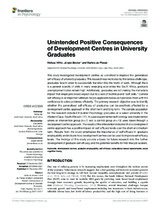| dc.contributor.author | White, Melissa | |
| dc.contributor.author | Becker, Jürgen | |
| dc.contributor.author | du Plessis, Marieta | |
| dc.date.accessioned | 2022-01-12T10:27:12Z | |
| dc.date.available | 2022-01-12T10:27:12Z | |
| dc.date.issued | 2021 | |
| dc.identifier.citation | White, M. et al. (2021). Unintended positive consequences of development centres in University graduates. Frontiers in Psychology, 12, 775377. 10.3389/fpsyg.2021.775377 | en_US |
| dc.identifier.issn | 1664-1078 | |
| dc.identifier.uri | 10.3389/fpsyg.2021.775377 | |
| dc.identifier.uri | http://hdl.handle.net/10566/7081 | |
| dc.description.abstract | This study investigated development centres as a method to improve the generalised
self-efficacy of university graduates. This research was motivated by the various challenges,
graduates face in order to successfully transition into the world of work. Although there
is a general scarcity of skills in many emerging economies like South Africa, graduate
unemployment rates remain high. Additionally, graduates are not making the immediate
impact that employers would expect due to a lack of technical and “soft skills.” General
self-efficacy is an important attribute for job applicants because it provides them with the
confidence to solve problems efficiently. The primary research objective was to identify
whether the generalised self-efficacy of graduates can be positively affected by a
development centre approach in the short-term and long-term. | en_US |
| dc.language.iso | en | en_US |
| dc.publisher | Frontiers Media | en_US |
| dc.subject | Development centres | en_US |
| dc.subject | Graduate employability | en_US |
| dc.subject | Self-efficacy | en_US |
| dc.subject | University | en_US |
| dc.subject | Industrial Psychology graduates | en_US |
| dc.title | Unintended positive consequences of development centres in University graduates | en_US |
| dc.type | Article | en_US |

